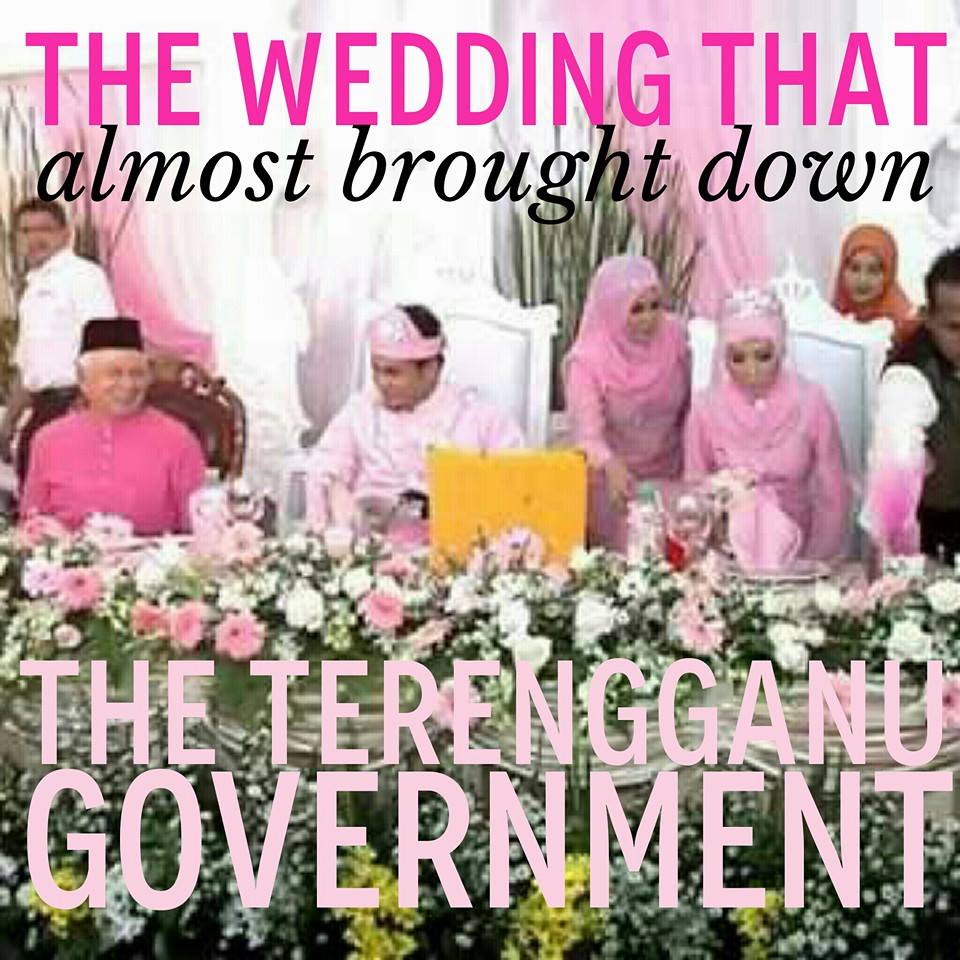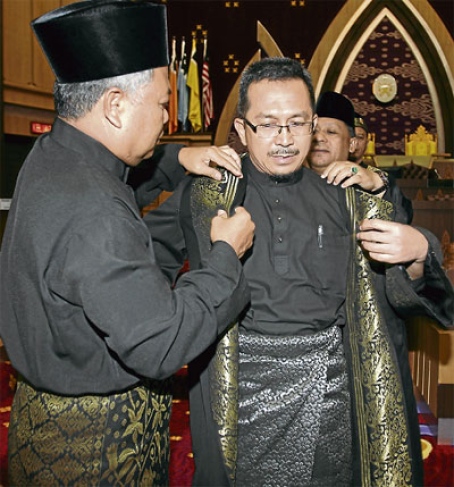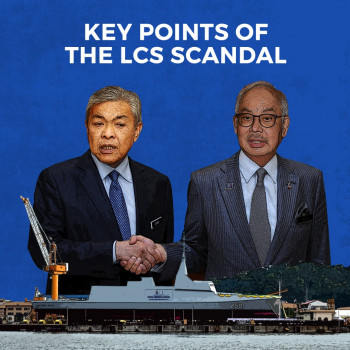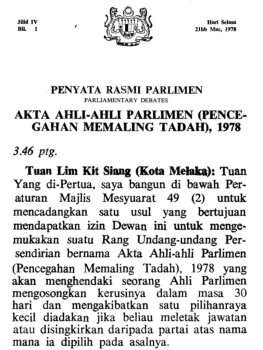by Political Studies for Change (KPRU)

Prime Minister Najib Razak attending the wedding of former Terengganu Menteri Besar Ahmad Said’s daughter
Election fever has become a phenomenon in this equatorial country ever since the March 8 political tsunami, which has changed the political landscape, though the political transformation has not completed yet. To a certain extent, each legislature at federal and state level has put a different complexion on politics. The recent Terengganu political crisis and the storming of the Penang state assembly by UMNO members have to do with legislative politics.
Legislative politics is different from election politics. From the parliament to legislature assembly in each state, the most frequent question that has been asked by people is about the attendance of members of elected representative, and as for some other incidents that have happened in legislature they have merely formed a part of their memory as people might find them obscure. Obscurity has become a byword for these pieces of memory due to the fact that people might not have the foggiest about these floating debris of memory.
The most unforgettable legislative incident to the people goes to the seizure of power in the Perak state, and despite that, people did not necessarily follow on all the details and issues arising from the incident of seizing power in Perak state.
This time – the Terengganu crisis is not only a political crisis, but also a ‘legislative crisis’. The lack of pressure from people in Terengganu lies in the insufficient knowledge about legislative which has saved Najib Razak’s shaky hold on power, as well as the dying Terengganu political and legislative crises from the jaws of death.
The incident got serious. Media started to report extensively and non-UMNO members in BN also thought that it was a red flag. However, from the Prime Minister Najib’s statement announcing that the Sultan of Terengganu, Sultan Mizan Zainal Abidin had consented to the resignation of Ahmad Said as well as the appointment of Ahmad Razif Abd Rahman as the new Terengganu Menteri Besar; to the dramatic twist of events where Ahmad Said and and two other UMNO state assemblymen quited the party and then later returned to the party, there appeared an unification in media reporting of the incident from the preparedness to deal with the incidents from different angles. As stability wins over anything else, water leaves behind no trails in its path.
From Najib’s statement on 12th May 2014 to the new Menteri Besar Ahman Razif’s taking of oath of office before Sultan Mizan; and to the former Menteri Besar Ahmad Said’s announcement made at his official residence in Kemaman as to his decision to withdraw his resignation from UMNO, the whole process took shorter than two days. Nonetheless, all of the incidents that have occurred in the midst of the Terengganu crisis must not be dismissed out of hand, particularly when comes to the interpretation of matters involving legislative, which calls for some clarification and so that when similar event takes place in future, people in the particular state would no longer stay static in the face of the crisis.
This Terengganu crisis, after Ahmad Said and two other UMNO state assemblymen quited the party, left Barisan Nasional with 14 state seats, against Pakatan Rakyat’s 15 in the assembly, giving an equation of 15:14:3, with 3 being the “independent reps”. On the same day, that is, 13th May, the Terengganu state legal advisor Datuk Azhar Abdul Hamid, when contacted by Bernama, has claimed that despite the fact that the number of BN assemblymen had dropped from 17 to 14, the state assembly Speaker was counted as a representative of the ruling state government, thereby giving an equation of 15:15:3.
It was Wesak day, which is also a public holiday. After founding director of think tank Political Studies for Change (KPRU), Ooi Heng and his family offered prayers in a Buddhist temple and after he came across Azhar’s misleading statement, Ooi Heng shared his personal view on Facebook, taking the view that the Speaker shall have the casting vote only when the voting comes down to a tie.
After talking to a journalist, Ooi Heng is even convinced that the real reason behind Terengganu state legal advisor making misleading statement was to buy some time for UMNO’s political power, so as to resolve the political and legislative crisis.

Terengganu assembly speaker, Mohd Zubir Embong, is not an elected representative, as he was appointed as assembly speaker on 16th June 2013 after being defeated in the election for Kuala Terengganu parliamentary seat. Hence, the controversy over the question of whether the speaker’s vote can be counted shall not even arise.
The Federal Constitution has given exposition on legislative power, which includes both parliament and state assembly, and under which the Speaker’s voting right is also covered. The Federal Constitution is basically modeled on the Westminster parliamentary system. Schedule 8, Paragraph 10 (1B) of the Federal Constitution makes it clear that the Speaker of legislative assembly who is not an elected representative has no voting power. Whereas according to the Article 27 (1B) of the Constitution of Terengganu, non-member of the Assembly elected as Speaker has no voting right.
Terengganu assembly speaker, Mohd Zubir Embong, is not an elected representative, as he was appointed as assembly speaker on 16th June 2013 after being defeated in the election for Kuala Terengganu parliamentary seat. Hence, the controversy over the question of whether the speaker’s vote can be counted shall not even arise.
In fact, not only does the state assembly follow the Westminster legislative custom, but the parliament of Malaysia is also following the system. The Article 57 (1A) of the Federal Constitution clearly provides that any person elected as Speaker of the House of Representatives who is not a member of the House of Representatives has no voting right. Furthermore, according to the Standing Order 45(1), the speaker shall be entitled to give his deciding ballot only when the voting comes down to a tie where ayes are equal to noes. This deciding ballot can be known as the casting vote, or ‘undi pemutus’ in Malay.
The aim of this article is to clear doubts on this legislative incident, and as far as the Speaker’s voting right is concerned, no critical comment is intended to be directed at the roles that both government and the opposition have played in this political power crisis. However, I am of the opinion that despite the misleading statement by the state legal advisor, government and opposition elites should still be held responsible politically for this legislative incident.
It is indeed bizarre that both government and opposition have no idea about the legislative procedures in the Terengganu state assembly when most of the assembly members are from UMNO and PAS. In the two days within which the 3 UMNO state assemblymen became ‘independent reps’ (Less than 48 hours), Terengganu state assembly has actually been beset with crisis. While there was likely UMNO fall down in Terengganu, UMNO has nonetheless got themselves some time to stabilise their shaky hold on power. Apart from UMNO taking the lead in this incident, the fact that PAS was being indifferent to the misleading statement will go down in the history of legislative politics.
History is bound to repeat when political elite’s political action has not been properly examined. -The Rocket
* The views expressed in this article are the personal opinion of the columnist





